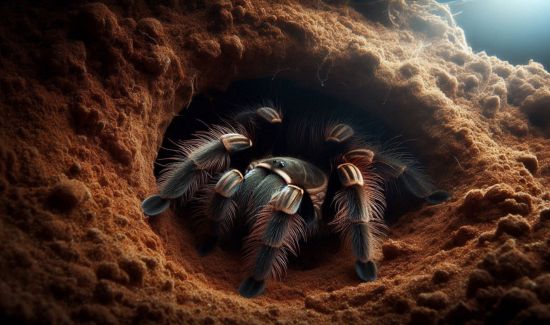Tarantulas are fascinating creatures, and their unique behaviors have made them popular pets among spider enthusiasts. However, just like humans, tarantulas can experience stress, which can significantly impact their health. But can tarantulas die from stress? In this article, we’ll explore how stress affects tarantulas, the signs of stress in these arachnids, and ways to prevent stress to ensure your tarantula lives a healthy, long life.
1. What is Stress in Tarantulas?
Table of Contents
Stress in tarantulas refers to a state where the spider is experiencing physical or psychological discomfort. This discomfort can stem from various factors, such as improper habitat, handling, or environmental changes. Just like any other living being, stress can impact a tarantula’s well-being, potentially leading to serious health issues.
2. Can Tarantulas Die from Stress?
Our question is can tarantulas die from stress? So the answer is Yes, tarantulas die from stress. While they are hardy creatures, prolonged exposure to stress can weaken their immune systems, making them more susceptible to illnesses and injuries. Severe stress can cause a tarantula to stop eating, become lethargic, or even experience a fatal molt. Therefore, it’s crucial for tarantula owners to recognize and minimize stress to ensure their pet’s survival.

How Stress Affects a Tarantula’s Health
Stress affects tarantulas in various ways, such as:
- Reduced Immune Function: Stress can weaken a tarantula’s immune system, making it easier for infections to take hold.
- Refusal to Eat: A stressed tarantula may stop eating, leading to malnutrition and weakening.
- Molting Issues: Stress can interfere with molting, a crucial process for a tarantula’s growth and health. In extreme cases, a failed molt can be fatal.
3. Causes of Stress in Tarantulas
Understanding the causes of stress in tarantulas is the first step toward preventing it. Here are some of the most common causes:
A. Improper Habitat
An inappropriate living environment is a leading cause of stress in tarantulas. Temperature, humidity, and space all play crucial roles in a tarantula’s well-being. If these factors are not properly regulated, the tarantula can become stressed.
- Temperature and Humidity: Tarantulas are sensitive to changes in temperature and humidity. If the environment is too hot, cold, dry, or humid, the tarantula may become stressed.
- Space: Tarantulas need enough space to move around and feel secure. A cramped enclosure can lead to stress.
B. Overhandling
Tarantulas are not pets that enjoy frequent handling. Overhandling can cause significant stress, as tarantulas perceive handling as a threat. Additionally, rough handling can cause physical injury, which adds to the stress.
C. Frequent Changes in Environment
Tarantulas thrive in stable environments. Frequent changes, such as moving their enclosure or changing the substrate too often, can be stressful. Tarantulas need time to adjust to their surroundings, and constant changes can disrupt their sense of security.
D. Lack of Hiding Places
Tarantulas are naturally reclusive creatures. They need hiding places in their enclosures to feel safe. A lack of such hiding spots can cause stress, as the tarantula will feel exposed and vulnerable.
E. Poor Diet
A poor diet can also contribute to stress in tarantulas. Feeding inappropriate food or not providing enough nourishment can lead to physical stress, impacting the tarantula’s overall health.
4. Signs of Stress in Tarantulas
Recognizing the signs of stress in your tarantula is essential to addressing the issue before it leads to serious health problems. Here are some common signs of stress in tarantulas:
A. Loss of Appetite
One of the most common signs of stress in tarantulas is a loss of appetite. If your tarantula refuses to eat for an extended period, it may be stressed.
B. Lethargy
A stressed tarantula may become lethargic and inactive. While tarantulas are generally not very active creatures, a noticeable decrease in activity can be a sign of stress.
C. Erratic Movements
Tarantulas experiencing stress may exhibit erratic or unusual movements. This can include pacing around the enclosure or attempting to climb the walls constantly.
D. Aggressiveness
Stress can also make a tarantula more aggressive or defensive. If your usually calm tarantula starts displaying aggressive behaviors, it could be due to stress.
E. Molting Problems
Molting is a vulnerable time for tarantulas, and stress can cause complications during this process. A stressed tarantula may struggle to molt successfully, which can be fatal.
5. How to Prevent Stress in Tarantula
Preventing stress in tarantulas involves creating a stable and suitable environment for them. Here are some steps to help minimize stress in your tarantula:
A. Maintain Proper Habitat Conditions
Ensure that your tarantula’s enclosure has the correct temperature, humidity, and space. Regularly monitor these conditions to keep them within the ideal range for your tarantula species.
B. Avoid Overhandling
Limit handling to necessary instances only. If you must handle your tarantula, do so gently and infrequently.
C. Provide Hiding Places
Include plenty of hiding spots in your tarantula’s enclosure. These can be in the form of artificial caves, logs, or burrows. Hiding places help tarantulas feel secure and reduce stress.
D. Feed a Proper Diet
Feed your tarantula a diet appropriate for its species and age. Ensure the food is nutritionally balanced to maintain the tarantula’s health and minimize stress.
E. Minimize Environmental Changes
Try to keep changes in your tarantula’s environment to a minimum. If you need to clean the enclosure or make adjustments, do so gradually to allow the tarantula time to acclimate.
FAQs About Can Tarantulas Die from Stress
1. Can stress cause a tarantula to stop eating?
Yes, stress can cause a tarantula to lose its appetite, which may lead to health issues if it persists.
2. How can I tell if my tarantula is stressed?
Common signs of stress in tarantulas include loss of appetite, lethargy, and erratic movements.
3. What should I do if my tarantula is stressed?
Address the cause of the stress by improving its habitat, minimizing handling, and providing hiding spots. If stress persists, consult a veterinarian.
4. Can a tarantula die from a stressful molt?
Yes, stress during molting can be fatal if the tarantula is unable to shed its exoskeleton properly.
5. What is the best way to prevent stress in tarantulas?
Maintain a stable environment with proper habitat conditions and minimize handling to prevent stress in tarantulas.

